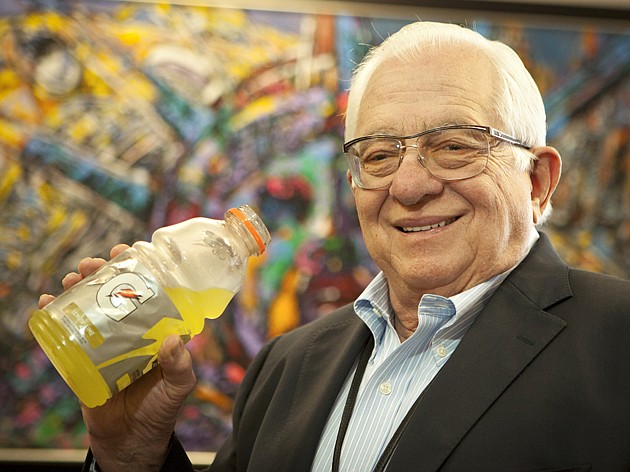- November 25, 2024
-
-
Loading

Loading

Dr. Alejandro de Quesada had $5 in his pocket when he left Cuba in 1959.
He had no other possessions, not even extra clothes. The Cuban government made sure of that when they strip-searched de Quesada at the airport before he left. His family stayed behind in Cuba, in the early days of Fidel Castro's rule. “(The regime) wanted me to sign a document that said I agreed with what they were doing,” recalls de Quesada about the communist takeover effort. “I refused to sign it. I decided to come to the States.”
A young kidney disease doctor who treated patients in Cuba for two years, a position awaited de Quesada at D.C. General Hospital. He would go on to practice and teach medicine for 40 years. He helped start the medical school at the University of South Florida and he co-founded the Lifelink Foundation of Florida, which facilitates organ and tissue donations.
But de Quesada, now retired and living in Tampa, has an even more unique accomplishment: He's one of four doctors who together invented Gatorade on the University of Florida campus in the summer of 1965. Nearly 50 years later the sports beverage remains a worldwide blockbuster product.
In a rare interview, de Quesada, 81, recently discussed his career with the Business Observer.
Growing up: de Quesada's family has deep roots in Cuba. His great-great-grandfather was chief justice of the Cuban Supreme Court. Ancestors on his wife's side of the family fought in Cuban civil wars in the 1800s. Says de Quesada: “We have a large heritage there.”
First rotation: de Quesada earned his medical degree from the University of Havana Medical School. Soon after he graduated he spent two years in a mountainous region of Cuba, where he treated some of the country's poorest people. He worked in a hut and had few supplies. “But it was a good experience,” says de Quesada. “I had no medicines, but I could relate to the people.”
Deep down: The birth of Gatorade, says de Quesada, goes back to a conversation in a UF cafeteria between a kidney disease specialist, Dr. Robert Cade, and Dwayne Douglas, an assistant football coach. The coach wanted to know why so many of his players were being zapped by heat and dehydration. Cade set out to solve the problem. He sent a protege, de Quesada, to the library to do some research on sweat and electrolytes. De Quesada says there were other researchers Cade could have sent. “I happened to be in the right place at the right time,” says de Quesada.
Right mix: The research team, according to UF, discovered the player's electrolytes were out of whack and their blood sugar was low. And nothing lost while the players sweat it out was being replaced. The solution, the team discovered, was a formula that mixed carbohydrates and electrolytes. They called the creation Gatorade, after the UF Gators. Yet de Quesada considered the formula medicine, not a beverage. “We were more interested in treating the individual with dehydration,” he says. “We never thought there was commercial value in that.”
Opportunity beckons: Gatorade's success spread quickly in the sports world. And Cade, says de Quesada, heard from dozens of doctors who sought the formula. “Another doctor told us we were sitting on something important,” de Quesada says, “and we should go market it as a product.” While de Quesada was confident the product worked, he was hesitant to get into a business. He was only making $400 a month, and had little room in his life for risk. “We could barely afford an attorney,” says de Quesada, who became an American citizen in 1966.
Still going: Gatorade, though, would soon rocket to success. Cade sold the U.S. rights to a canned food company, Stokely-Van Camp in 1967. That firm manufactured the drink through the 1980s, until Quaker Oats Co. bought it for $220 million. Gatorade is currently manufactured by PepsiCo and available in more than 80 countries. It has spawned a line of sister products, in addition to several competitors.
Big payday: The early success of Gatorade also led to a dispute in the 1970s, between UF and the research team. The conflict was over who technically owned the rights to the drink because the researchers received some federal grant money for the project. The disagreement was settled and UF has since made more than $150 million in royalties off Gatorade. The research team still gets royalty checks, too. De Quesada declines to say how much he's received in Gatorade royalties, only that it's in the multimillions. “The Gatorade income allowed me to do the type of medicine I wanted to do without looking at the financial aspect,” de Quesada says. “We were lucky.”
Constant learner: The doctor-inventor also used the income to help send his children and grandchildren to top schools. That follows a lesson he learned from Castro's Cuba, that an education is the best way to overcome life's challenges. “There are certain things,” says de Quesada, “that no one can take away from you.”